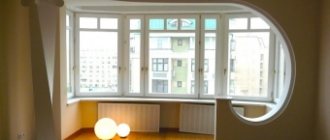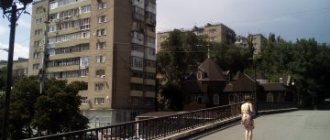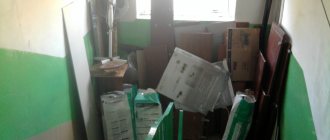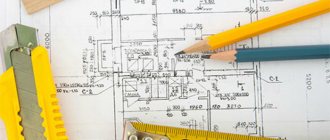Legislation
- The Code of the Russian Federation on Administrative Offenses No. 195-FZ of December 30, 2001, in Article 7.21, establishes fines for illegal changes to the layout of an apartment.
- The Housing Code of the Russian Federation No. 188-FZ dated December 29, 2004, in articles 29, 26, 25, speaks of permissible alterations and provides for liability for them.
- Decree of the State Construction Committee of the Russian Federation dated September 27, 2003 No. 170 lists the rules for the technical operation of residential buildings.
- Building regulations 54.13330.2011 prohibit rearranging rooms, kitchens, and bathrooms.
- SanPiN 2.1.2.2645-10 requires not changing the openings of bathrooms, not combining adjacent rooms, and determines the permissible room sizes and lighting conditions.
- Technical regulations for fire safety No. 122-FZ dated July 22, 2008 prohibit the removal of gas equipment and the installation of open hearths and wood-heated fireplaces in apartments.
Regarding the redevelopment. The neighbors demolished the non-load-bearing wall between the room and the kitchen.
Is it possible to combine a toilet with a bathroom if there is no load-bearing wall between them?
Is it possible to combine a toilet with a bathroom if there is no load-bearing wall between them?
You must act in the manner prescribed by law (see below).
HOUSING CODE OF THE RUSSIAN FEDERATION
Chapter 4. RENOVATION AND RE-PLANNING OF RESIDENTIAL PREMISES
Article 25. Types of reconstruction and redevelopment of residential premises
1. Reconstruction of residential premises is the installation, replacement or transfer of utility networks, sanitary, electrical or other equipment that requires changes to the technical passport of the residential premises.
2. Redevelopment of a residential premises is a change in its configuration, requiring changes to the technical passport of the residential premises.
Article 26. Grounds for reconstruction and (or) redevelopment of residential premises
1. Redevelopment and (or) redevelopment of residential premises is carried out in compliance with the requirements of the law in agreement with the local government body (hereinafter referred to as the body carrying out the approval) on the basis of a decision made by it.
2. To carry out the reconstruction and (or) redevelopment of residential premises, the owner of this premises or a person authorized by him (hereinafter in this chapter - the applicant) to the authority carrying out the approval at the location of the rebuilt and (or) replanned residential premises directly or through the multifunctional center in in accordance with the interaction agreement concluded by them in the manner established by the Government of the Russian Federation:
(as amended by Federal Law dated July 28, 2012 N 133-FZ)
1) an application for reconstruction and (or) redevelopment in the form approved by the federal executive body authorized by the Government of the Russian Federation;
(as amended by Federal Law No. 160-FZ of July 23, 2008)
2) title documents for the rebuilt and (or) re-planned residential premises (originals or notarized copies);
3) a project for the reconstruction and (or) redevelopment of the residential premises being rebuilt and (or) redesigned;
4) technical passport of the residential premises being rebuilt and (or) replanned;
5) consent in writing of all members of the tenant’s family (including temporarily absent family members of the tenant) occupying the rebuilt and (or) re-planned residential premises on the basis of a social tenancy agreement (if the applicant is authorized by the landlord to submit the provisions provided for in this paragraph documents of the tenant of the rebuilt and (or) replanned residential premises under a social tenancy agreement);
6) the conclusion of the body for the protection of architectural, historical and cultural monuments on the admissibility of reconstruction and (or) redevelopment of a residential premises, if such a residential premises or the house in which it is located is an architectural, historical or cultural monument.
2.1. The applicant has the right not to submit the documents provided for in paragraphs 4 and 6 of part 2 of this article, as well as if the right to the rebuilt and (or) re-planned residential premises is registered in the Unified State Register of Real Estate, the documents provided for in paragraph 2 of part 2 of this article. To consider an application for reconstruction and (or) redevelopment of residential premises, the approval authority at the location of the residential premises being rebuilt and (or) replanned requests the following documents (copies thereof or information contained in them), if they were not submitted by the applicant on his own initiative :
(as amended by Federal Laws dated 06/02/2016 N 175-FZ, dated 07/03/2016 N 361-FZ)
1) title documents for the rebuilt and (or) re-planned residential premises, if the right to it is registered in the Unified State Register of Real Estate;
(as amended by Federal Law dated July 3, 2016 N 361-FZ)
2) technical passport of the residential premises being rebuilt and (or) replanned;
3) the conclusion of the body for the protection of architectural, historical and cultural monuments on the admissibility of reconstruction and (or) redevelopment of a residential premises, if such a residential premises or the house in which it is located is an architectural, historical or cultural monument.
(Part 2.1 introduced by Federal Law dated December 3, 2011 N 383-FZ)
3. The body carrying out the approval does not have the right to require the applicant to submit other documents other than documents, the request of which from the applicant is allowed in accordance with parts 2 and 2.1 of this article. The applicant is issued a receipt of documents from the applicant indicating their list and the date of their receipt by the body carrying out the approval, as well as indicating the list of documents that will be received upon interdepartmental requests. In case of submission of documents through a multifunctional center, a receipt is issued by the specified multifunctional center. State bodies, local self-government bodies and organizations subordinate to state bodies or local self-government bodies, which have at their disposal the documents specified in Part 2.1 of this article, are obliged to send to the body carrying out the approval the documents requested by such body (their copies or the information contained in them) . The requested documents (their copies or the information contained therein) may be submitted on paper, in the form of an electronic document, or in the form of copies of the requested documents certified by an authorized person, including in the form of an electronic document.
(Part 3 as amended by Federal Law dated December 3, 2011 N 383-FZ (as amended on July 28, 2012))
4. The decision to approve or refuse approval must be made based on the results of consideration of the relevant application and other documents submitted in accordance with parts 2 and 2.1 of this article by the body carrying out the approval, no later than forty-five days from the date of submission of documents to this body , the obligation to submit which in accordance with this article is assigned to the applicant. If the applicant submits the documents specified in Part 2 of this article through the multifunctional center, the period for making a decision on approval or refusal of approval is calculated from the day the multifunctional center transmits such documents to the body carrying out the approval.
(Part 4 as amended by Federal Law dated December 3, 2011 N 383-FZ (as amended on July 28, 2012))
5. The body carrying out the approval, no later than three working days from the date of the decision on approval, issues or sends to the address specified in the application, or through the multifunctional center, a document confirming the adoption of such a decision to the applicant. The form and content of this document are established by the federal executive body authorized by the Government of the Russian Federation. If an application for reconstruction and (or) redevelopment is submitted through a multifunctional center, a document confirming the decision is sent to the multifunctional center, unless another method of receiving it is specified by the applicant.
(as amended by Federal Laws dated July 23, 2008 N 160-FZ, dated July 28, 2012 N 133-FZ)
6. The document provided for in Part 5 of this article is the basis for the reconstruction and (or) redevelopment of residential premises.
Article 27. Refusal to approve the reconstruction and (or) redevelopment of residential premises
1. Refusal to approve the reconstruction and (or) redevelopment of residential premises is permitted in the following cases:
1) failure to submit documents specified in Part 2 of Article 26 of this Code, the obligation to submit which, taking into account Part 2.1 of Article 26 of this Code, is assigned to the applicant;
(as amended by Federal Law dated December 3, 2011 N 383-FZ)
1.1) receipt by the body carrying out the approval of the response of a state authority, local government body or an organization subordinate to a state authority or local government body to an interdepartmental request indicating the absence of a document and (or) information necessary for carrying out reconstruction and (or) redevelopment residential premises in accordance with Part 2.1 of Article 26 of this Code, if the relevant document was not submitted by the applicant on his own initiative. Refusal to approve the reconstruction and (or) redevelopment of residential premises on the specified basis is permitted if the body carrying out the approval, after receiving such a response, notified the applicant about the receipt of such a response, invited the applicant to submit the document and (or) information necessary for the reconstruction and (or) redevelopment of residential premises in accordance with Part 2.1 of Article 26 of this Code, and did not receive such a document and (or) information from the applicant within fifteen working days from the date of sending the notification;
(clause 1.1 introduced by Federal Law dated December 3, 2011 N 383-FZ)
2) submission of documents to the improper authority;
3) non-compliance of the project for reconstruction and (or) redevelopment of residential premises with the requirements of the law.
2. The decision to refuse approval for the reconstruction and (or) redevelopment of residential premises must contain the grounds for the refusal with a mandatory reference to the violations provided for in Part 1 of this article.
3. The decision to refuse approval for the reconstruction and (or) redevelopment of residential premises is issued or sent to the applicant no later than three working days from the date of such decision and can be appealed by the applicant in court.
Article 28. Completion of reconstruction and (or) redevelopment of residential premises
1. Completion of the reconstruction and (or) redevelopment of the residential premises is confirmed by an act of the acceptance committee.
2. The acceptance committee’s report must be sent by the body carrying out the approval to the rights registration body.
(as amended by Federal Laws dated May 13, 2008 N 66-FZ, dated July 3, 2016 N 361-FZ)
Article 29. Consequences of unauthorized reconstruction and (or) unauthorized redevelopment of residential premises
1. Reconstruction and (or) redevelopment of residential premises carried out in the absence of the basis provided for in Part 6 of Article 26 of this Code, or in violation of the reconstruction and (or) redevelopment project submitted in accordance with paragraph 3 of Part 2 of Article 26 of this Code are unauthorized.
2. A person who has unauthorizedly rearranged and (or) redesigned residential premises bears the responsibility provided for by law.
3. The owner of a residential premises that was unauthorizedly rearranged and (or) redesigned, or the tenant of such residential premises under a social tenancy agreement, is obliged to bring such residential premises to their previous condition within a reasonable time and in the manner established by the body carrying out the approval.
4. Based on a court decision, residential premises may be preserved in a rebuilt and (or) redesigned state, if this does not violate the rights and legitimate interests of citizens or does not create a threat to their life or health.
5. If the relevant residential premises are not restored to their previous condition within the period specified in part 3 of this article in the manner established by the body carrying out the approval, the court, at the request of this body, provided that the decision provided for in part 4 of this article is not made, makes a decision:
1) in relation to the owner of the sale of such residential premises at public auction with payment to the owner of the proceeds from the sale of such residential premises minus the costs of executing a court decision with the imposition on the new owner of such residential premises of the obligation to bring it to its previous condition;
2) in relation to the tenant of such residential premises under a social tenancy agreement, to terminate this agreement with the imposition on the owner of such residential premises, who was the lessor under the said agreement, of the obligation to bring such residential premises to its previous condition.
6. The body carrying out the approval, for the new owner of the residential premises, which was not brought to its previous state in the manner established by part 3 of this article, or for the owner of such residential premises, who was the lessor under an agreement terminated in the manner established by part 5 of this article, establishes a new period for bringing such residential premises to their previous condition. If such residential premises are not restored to their previous condition within the specified period and in the manner previously established by the body carrying out the approval, such residential premises shall be subject to sale at public auction in the manner prescribed by Part 5 of this article.
What not to do
The law prohibits any actions that could lead to a deterioration in the quality of housing of neighbors. For example: cracks appeared in the walls, dampness and mold appeared on the floor and ceiling.
The agreed redevelopment project includes not only permission to carry out work, but also stipulates:
Free HOTLINE:
Moscow time 8 (499) 938 6124
St. Petersburg 8 (812) 425 6761
Fed 8 (800) 350 8362
- the time of their implementation;
- procedure for removing construction waste;
- describes materials that can be used.
Important: the consequences of destruction caused by redevelopment will be paid by the owner of the premises.
In the apartment
Some types of apartment renovation may be permitted by regulatory authorities after completion. However, there are changes that will not be considered legal:
- Conversion of housing into shops, offices, warehouses, saunas - in this case, a preliminary assessment of the condition of the building and its systems is required. It is done by organizations - the authors of the house project. Most often these are research institutes.
- Destruction of walls that provide strength and stability of the structure, including additional entrances and exits, window extensions.
- Removal of ventilation ducts and shafts.
- Placing equipment whose weight increases the load on the floor, water supply, and power supply. For example, installing industrial washing machines, replacing gas stoves with electric ones.
- Moving the heating system to the balcony.
- Use for heating floors of central water supply.
- Violations of sanitary, fire, and construction regulations.
- Combining the kitchen and rooms if a gas stove is installed. In this case, a partition between them is required.
- Placement of electrical wiring in the joints of the building.
- Swap kitchens, bathrooms and rooms.
- Make openings and niches in the walls of neighboring apartments, if they are not intended to be combined.
Also, you cannot enter the toilet through the kitchen or room. Such a change is allowed if a wheelchair user lives in the apartment. Residents of the first and last floors can occupy part of the attic and basement, but only if all the neighbors do not object. It is allowed to make a larger bathroom at the expense of a corridor or storage room, provided that high-quality waterproofing is carried out.
Relocating doors inside the apartment and erecting walls should not create additional load on the floor; it is permissible to approve them after the work is completed.
In non-residential premises
Redevelopment of non-residential premises of an apartment building requires mandatory permission from regulatory authorities. The main evaluation criterion is the safety of residents. Prohibited:
- Equipping entrances from the street through widened window openings.
- Actions that destroy the foundation.
- Placement of saunas and swimming pools in residential buildings.
- Reducing the distance between external and internal entrance doors.
- Restricting access to taps, valves, pipes that allow you to shut off water and gas during emergencies.
If the changes do not pose a threat to residents, they are recognized as legal subject to the necessary conditions.
Apartment redevelopment where to apply
Advice from lawyers:
Where should I go if I am remodeling my apartment?
2 answers
Redevelopment of a mortgaged apartment. How to legitimize? Where to contact?
1 answer
Where to go if all the walls are demolished without permission to redevelop an apartment?
1 answer
New building, mortgage, Moscow region, 1st floor, high ceilings (4 m), I want to make a mezzanine floor + move the wall between the rooms...
2 answers
I filed a lawsuit against the city administration for an unjustified refusal to redevelop and transfer a one-room apartment on the 1st floor of the MK to non-residential premises.
1 answer
When purchasing an apartment with a mortgage, it turned out that the built-in closet, which was listed in the plan and technical certificate, had been demolished; the transaction had not yet been completed.
3 answers
Illegal redevelopment of an apartment by a neighbor On the ground floor The result is that everything is skewed Old stock Where to go to call a commission.
2 answers
We have received a court decision to leave the apartment in a redesigned state, where should we go with it next? Or is the redevelopment already considered legal?
1 answer
What to do next and where to go after the court has satisfied the claim for redevelopment of the apartment?
3 answers
I inherited an apartment; door blocks were removed and arches were made in the kitchen and dressing room; there was gas in the house.
1 answer
IN THE INSTRUCTION Deputy Head of the City Administration The district indicates unauthorized redevelopment of residential premises/premises.
3 answers
The neighbors from the apartment on the higher floor were remodeling the Apartment, after their renovation, we have wild audibility in the Apartment, now we live like in a small family!
2 answers
After redevelopment of the apartment, we received an acceptance certificate for the apartment.
1 answer
Question: 20 years ago a certificate of ownership was received for an apartment with one square footage.
2 answers
Help me please! I live in a four-room apartment, in shares, with a new redevelopment.
2 answers
As a result of the redevelopment and renovation of the office on the first floor, significant cracks appeared in the walls in my apartment, which is located above, on the second floor.
3 answers
The question is this. We are renovating a privatized apartment that we recently purchased.
1 answer
The court ordered the defendant to restore the interfloor ceiling (the floor in my apartment subsided as a result of illegal redevelopment).
1 answer
How to legalize the redevelopment left by the previous owners and not reflected in the registration certificate for the apartment, where to apply and in what order?
2 answers
Is it possible to make a redevelopment in a municipal apartment - move the wall (the wall is not the main one)
2 answers
A long time ago there was a redevelopment of two apartments into one, adjacent and on the same floor, everything was formalized according to the law.
2 answers
I remodeled the apartment and added a bathroom. knot and cut an arch in the wall, I want to legalize the documents for sale. Where to contact? Thank you.
2 answers
I have remodeled my apartment and want to legalize it. Tell me where to go? Thank you.
2 answers
I want to buy a studio apartment in the city of Sterlitamak and remodel it in the future.
1 answer
I am planning to sell the apartment; several years ago I remodeled the wall between the bathroom and the kitchen, which increased the kitchen area.
1 answer
Question about redevelopment of an apartment - a door was removed from a non-load-bearing wall, the doorway was enlarged, is this considered a redevelopment, if so, where to go now in 2020.
1 answer
Please tell me what should I do? I bought an apartment, but unfortunately
1 answer
The neighbors below did a redevelopment - they removed all the walls and partitions. We began to notice: the floor began to creak, the cabinet doors were warped, and cracks appeared on the walls.
1 answer
We want to sell the apartment, but it has illegal redevelopment (two rooms have balconies).
2 answers
Do I have the right to remodel my own apartment? If yes, where should you apply to obtain permission?
1 answer
Where to go if the realtor did not conduct the transaction cleanly (did not double-check the documents)
1 answer
I want to remodel my 1-room apartment using a common
2 answers
We live in a 5-story building. Initially, the first floor was planned as a non-residential space,
1 answer
How to restore the original layout of an apartment after redevelopment? Do I need permission, where to apply and what documents are needed?
1 answer
There is active redevelopment under my apartment with the aim of using this premises as non-residential,
1 answer
The essence of the problem is that they recently bought an apartment above us and are remodeling it,
1 answer
We are privatizing an apartment. There is a redevelopment. To legitimize it, where should I apply?
1 answer
The apartment was remodeled from a one-room to a two-room apartment without approval (the footage and windows allow).
1 answer
I want to remodel my apartment, where do I need to go to get it legalized?
1 answer
I want to remodel my apartment and partially break down the wall. Where to apply for permission? And what documents are needed for this?
2 answers
There was a cabinet made of fiberboard in the apartment; it was included in the apartment plan. Over the years of use it has become dilapidated.
1 answer
Where should you go if you want to remodel your apartment? I have a room with a kitchen and a non-load-bearing wall. Where should I go so that they don’t run over me during the planning?
1 answer
We divorced. The apartment was divided in half. There is a court decision. Where to start registering your share, given that the apartment has unregistered redevelopment.
2 answers
I made a redevelopment in the apartment (unauthorized, without approval) - I removed the wall between the bathroom and toilet (the wall is not load-bearing).
2 answers
Where to apply first for privatization of an apartment if it is state-owned? and there is an unregistered redevelopment. Course of action?
1 answer
Where should I go if they are remodeling the apartment below mine and they have been breaking down the walls for three days now? Everything flies and wobbles for me.
1 answer
Where to go to legalize the redevelopment that has already been done in an apartment on the 10th floor of a 10-story building (opening in the wall)
1 answer
In a room of 19.6 sq m, two parts of the room have been remodeled, now there is a kitchen and a bedroom,
1 answer
The apartment on the floor above is undergoing illegal redevelopment with the removal of partitions.
2 answers
We are three sisters, each with a 1/3 share in a three-room apartment. The older sister remodeled it (she didn’t design anything)
2 answers
We pay for heating using a common house meter; we have 8 fins per room (1 fin per 2 m2).
1 answer
There is an agreement for the transfer of ownership of the apartment. You need to get a new type of ownership document.
1 answer
The neighbors are remodeling and the ceilings in the rooms are cracked. Master
2 answers
I inherited an apartment from my mother. After the notary, I submitted the documents to the registry office.
2 answers
The redevelopment was done back in 2007 with permission, so now where do I go to make changes to the documents for the apartment?
1 answer
They wanted to privatize a municipal apartment. Warrant since 1990. They said we need a BTI plan.
1 answer
We have a long narrow corridor at the entrance, the neighbors installed an iron door,
1 answer
I inherited an apartment, now I want to sell it. But it turned out that 30-40 years ago one of the corridor partitions was moved there.
1 answer
The neighbors above have connected two apartments, the house is two-story, old, now we are afraid that it will collapse, where to go and whether their redevelopment is legal.
1 answer
A three-story unfinished house was sold on a neighboring plot.
1 answer
The neighbors upstairs have remodeled, we can now hear any rustling noise in our apartment, conversations with neighbors have led nowhere.
1 answer
Please enlighten me where to go and what documents are needed to document unauthorized redevelopment in an apartment?
1 answer
As part of the program for the improvement of residential buildings, timed to coincide with the Universiade, the balcony in the apartments of the house was replaced (new balcony structures were installed).
2 answers
Good afternoon. I live in a house where several levels of windows overlook the roof.
2 answers
As a result of the redevelopment, the heated towel rail riser was changed and the joint was filled with cement.
1 answer
I broke the partition between the bathroom and toilet. Could I have any problems?
1 answer
I own 1/2 of a two-room apartment, in which I do not live.
1 answer
When privatizing the apartment, problems arose with the BTI, namely regarding the gas boiler.
1 answer
Who makes a fire safety report in Barnaul that the redevelopment of an apartment complies with fire standards? Where should I go? Thank you very much.
2 answers
The apartment has an unauthorized redevelopment (a small storage room made of plasterboard), what documents are needed to legalize it? And where should you go?
2 answers
The neighbor in the communal apartment has not lived for more than 10 years (he permanently resides in Baku)
1 answer
At the moment the owner of the apartment is my mother, what documents are needed to re-register in her name.
1 answer
I have a problem. The neighbors through the wall rumble and stomp at night every night, year.
1 answer
How can we legitimize redevelopment if the wall was not load-bearing and was moved before we moved into the apartment as an exchange more than 25 years ago?
1 answer
The redevelopment in the communal apartment was carried out by Zhek before 1984 and consists of a partition in the passage room,
1 answer
The neighbors remodeled the apartment: they installed a bathroom above the living spaces,
1 answer
We are going to independently coordinate the redevelopment of our apartment; the load-bearing walls are not affected.
1 answer
An unauthorized redevelopment was carried out in the communal apartment; the wall between the kitchen and the room was partially dismantled.
1 answer
Responsibility
The person who carried out the redevelopment will be responsible for the redevelopment. In 2017, the Supreme Court decided that it was impossible to punish a homeowner who received an apartment with illegal changes.
For such violations, a fine of 2,500 rubles is provided for citizens and up to 1 million rubles for organizations. Paying it does not relieve you from the obligation to legalize the redevelopment or return the housing to its original form, in particular, to demolish the erected brick partitions and terraces.
If the owner of the premises refuses to comply with the requirements of the court or supervisory authorities, the apartment can be sold at auction, after which the owner can be evicted. The owner will receive part of its price. Work to eliminate violations will be paid from the cost of the sold property.
An exceptional penalty may be imprisonment of up to 12 years if the building collapses.
The owner of such an apartment will compensate for the damage caused by his actions to other residents. The decision on the seizure and sale of housing is made by the court.
In what cases should you file a complaint?
It is difficult to detect the redevelopment of someone else's apartment. Questions arise when neighbors are faced with the consequences of repairs:
- long-term operation of construction tools - hammer drills, saws;
- a large amount of garbage;
- the appearance of cracks in the walls;
- sewer leaks;
- ventilation disturbance.
Projects of apartment buildings assume that neighbors share the same amount of water, gas, and electricity. Unauthorized connections and changes to systems may violate the rights of others.
Important : the owner of the apartment being renovated is responsible for the removal of construction waste.
They're tearing down the walls
Demolition of walls between rooms can lead to various consequences, for example, deflection of interfloor ceilings. Sanitary standards for the area of rooms and bathrooms are provided. Increasing the size of rooms and additional openings in load-bearing walls can affect the stability of the entire building and lead to its destruction. It is prohibited to demolish them.
The ventilation was blocked
Ventilation shafts run from the first to the last floor; they allow the air in the rooms to be renewed. Any changes to their design can lead to gas accumulation in apartments and the appearance of dampness. Such violations can be proven after inspection of neighboring housing by specialists from supervisory agencies.
Moved the kitchen to another room
Such redevelopment can cause problems associated with water and sewage leaks. If, after renovations carried out by neighbors, dampness appears in the rooms and this is not due to natural causes, you should find out whether one of the residents has had their kitchen or bathroom moved.
Sewage problems
Sewer risers are located throughout the house. Their movement may impair system performance for other residents. It is possible to detect illegal repairs carried out by neighbors if regular blockages occur and waste flow worsens.
What can be attributed and how to identify it?
Illegal redevelopment is far from a rare occurrence today. People, moving to secondary housing, want to do everything at their own discretion, based on their own interests, sometimes without thinking that some actions may have a detrimental effect on the integrity of the building and safety standards. Today, in order to carry out redevelopment or reconstruction of an apartment, it is necessary to obtain special permission from the housing inspectorate, which checks the compliance of the owner’s plans with legal norms.
Read about the cost of redevelopment here.
Some activities do not require permits, but most work must be approved. If you notice that workers are removing large pieces of brick cemented together from the apartment, then the neighbors are most likely working on load-bearing walls, which is quite difficult to authorize. In such situations, being vigilant and reporting unauthorized redevelopment is not only possible, but also necessary, because such actions can damage the entire house.
Where to complain if neighbors do illegal redevelopment
In this case, the management company and homeowners association will help. Internal changes to the apartment must not violate the rights of other residents. It will not be possible to enter your neighbor’s apartment without his consent; only the court can give permission for such actions.
To the management company
The organization’s specialists can visit apartments during scheduled events: when checking water meters, electricity, gas equipment. A neighbor's complaint will serve as a basis for checking the apartment, but will not allow entry without the owner's permission.
District Administration
Self-government bodies must be notified about illegal redevelopment of an apartment. If the housing space being repaired belongs to the municipality, then the owner, i.e., the administration, will automatically take care of this matter. She is obliged to contact the supervisory and judicial authorities herself.
If the apartment belongs to the tenant, then upon receiving the complaint, the administration will check whether he has permission for redevelopment work; such permission is issued by the municipality. They will also clarify the availability of a technical design for the work being carried out.
To the housing inspection
The inspector will check the application. If he fails to get into the home twice, the information will be submitted to the court. The latter's decision will oblige the owner of the premises to prove the legality of the change in layout. It will not be possible to avoid a fine in this situation.
To the prosecutor's office
Prosecutor's office employees work with people's requests, identifying and eliminating violations of the law. Upon receipt of a complaint about unauthorized redevelopment, an inspection is organized. The prosecutor can go to court to protect the residents of the entire house, and can demand the eviction of the offender.
To court
Judges consider claims. In case of damage caused by changes in a neighbor's apartment, you should contact the district court. The claim is filed at the place of residence of the defendant. In this case, it is necessary to prove the connection between the work performed and the consequences that arose.
You can complain to several departments at the same time. Where exactly to write the application is up to the person to decide.
Important: court decisions can only be appealed to higher authorities; other departments cannot overturn a court decision.
Going to court
The prosecutor's office, the Housing Inspectorate, as well as citizens who fear for the safety of their apartments can go to court with a complaint about illegal redevelopment. However, it is important to take into account a very important nuance : while the proceedings were ongoing in previous instances, the neighbor may have time to sell his property along with the illegal redevelopment, and the new owner will not be recognized by the court as an appropriate defendant.
Meanwhile, when it is citizens, and not supervisory authorities, who go to court, the statement of claim must be accompanied by the results of appeals to the Housing Inspectorate and the Prosecutor's Office, thereby proving that the pre-trial procedure for resolving the dispute was completed properly.
The application is accompanied by documents that reflect the condition of the housing before the start of redevelopment, as well as after it. This will avoid any doubt that a violation of building codes actually occurs. The results of the examination will not be superfluous, which will confirm the damage already caused and possible in the future to the neighbors’ apartments. For example, this may be the result of an examination of a crack in a supporting structure and an expert’s conclusion about further destruction. If the result of illegal redevelopment was flooding, a rupture of a gas pipe, destruction of a sewer system, clogging of ventilation shafts and other consequences, then for each one you will also need not only an inspection report, but also an expert opinion indicating the cost of eliminating these consequences.
The statement of claim will need to formulate demands, which may include not only the elimination of violations, but also compensation for damage caused by illegal redevelopment.
If you have any questions about illegal redevelopment or need help preparing a statement of claim in court, then our on-call lawyer is at your service. You can ask your question for free in the form below.
Sample complaint
Complaints are written in free form and must include:
- addressee's name;
- information about the person applying - his last name, first name, patronymic, address, phone number, email;
- description of the problem;
- demands and suggestions for a way out of the situation;
- Date of preparation;
- providing evidence.
To contact the Criminal Code, you need to describe in detail the inconvenience caused by your neighbors. This includes:
- noise from operating equipment for several days in a row;
- bags of construction waste in the entrance;
- dust and dirt on staircases;
- appeared cracks;
- drips on the walls.
Other residents can confirm the actions of neighbors, photographs of the entrance, damp spots, fragments of bricks, concrete.
Appeals are submitted to the State Housing Inspectorate in the same manner. They can be sent via the Internet. The same documents can be cited as evidence. It is possible to attach an expert opinion on the identified damage.
An application to the prosecutor's office is submitted to the district prosecutor. You can complain both about the actions of residents and about the inaction of other departments. In the latter case, they refer to the responses of the housing inspectorate and the service organization.
The courts work with claims. They are submitted by citizens and organizations. The plaintiff will have to prove the case. In this case, careful preparation is necessary: assessment reports, expert opinions on the causes of identified deficiencies and the possibility of eliminating them will be required. Copies of claims in the Criminal Code and responses to them are required. The text must contain references to legislation. A sample application can be found on stands in court buildings and on official websites.
The free form of appeals presupposes a correct and detailed description of the situation that has arisen, without the use of rude, harsh statements, insults to other people, false information, or speculation. You need to approach writing responsibly. It must be literate and consistent so that the meaning of the message is not lost. The document is signed by the applicant or his representative.
Where and how to complain about redevelopment
You can file a complaint with any of the following organizations:
- Housing inspection.
- Management Company.
- Court.
Every place has its own characteristics. Let's look into it in detail.
Housing inspection
You can file a complaint with the housing inspectorate through the Housing Information System. To do this, just log in to the portal through “Government Services” , then go to the “Electronic Services” .
How to file a complaint about your neighbors' redevelopment:
- Select “Submit a complaint or appeal.”
- Check the information about the applicant in the application form that opens.
- Indicate the information and the subject of the appeal – “Illegal reconstructions.”
- Write the essence of the complaint.
- Submit your request for review.
If possible, it is recommended to attach photographs of illegal redevelopment. But even without them, the application will be considered within 30 calendar days.
After verification, the applicant will be given a response by email.
In addition to the GIS Housing and Communal Services, you can submit a complaint in person to the Housing and Communal Services Department, or send it by registered mail with acknowledgment of receipt.
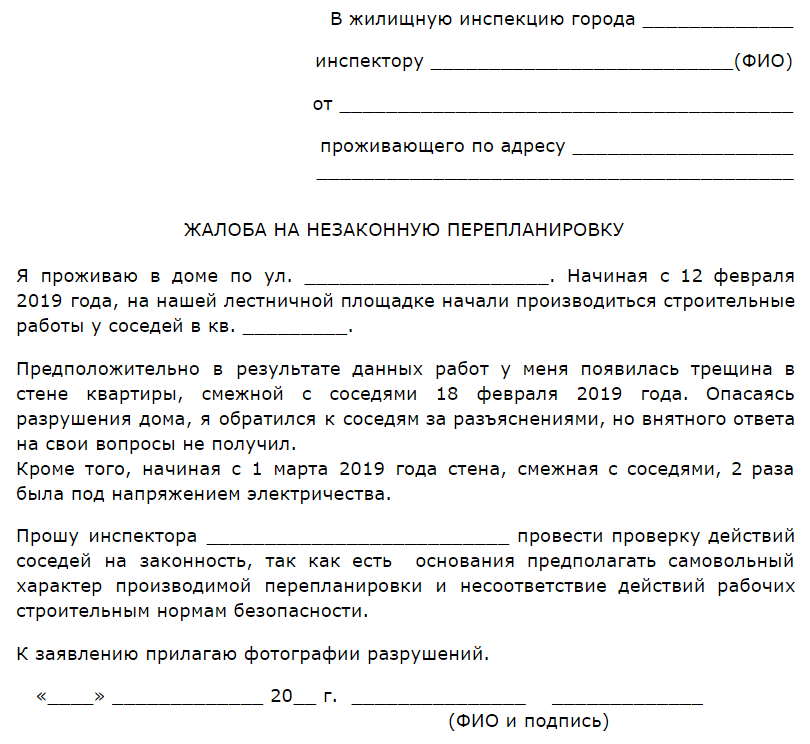
Management Company
You can also complain to the management company; it is responsible for the condition of the common property as a whole. If as a result of redevelopment it is damaged, the interests of the management company are also affected.
The procedure for filing a complaint with the Criminal Code is the same as for the housing inspectorate.
Having received the request, company employees will go to the address indicated in it for verification, and here one of two options is possible:
- The owner who started the illegal planning will open the door . If violations are discovered, he will be fined under the Code of Administrative Offenses of the Russian Federation. We will either have to legitimize everything, or return the structure of the premises to its previous state.
- The owner will not open the door . If after two visits the Criminal Code commission does not get to him for verification, the documents will be sent to the court.
Note: if the management company does not respond to the appeal within 30 days, you can file a complaint with the State Housing Supervision, but this time about the company’s inaction.
Court
You can also complain about the redevelopment to the court by filing a statement of claim. But only if the neighbors’ illegal actions damaged the plaintiff’s property. Damages are recovered through the court. In other cases, the documents are submitted there by the housing inspectorate.
In order to recover compensation for damaged property, you will need an expert opinion confirming that the damage was caused precisely by the neighbors’ illegal work. It also indicates the total amount of damage.
Submission process
You can submit a claim in person, by letter or by email.
When applying in person, you should take a copy of the application with you; it will be marked as having been received.
Complaints to the management company or housing inspection are accepted by secretaries or dispatchers.
Applications to the prosecutor's office are transferred to the officer on duty at a personal reception. These could be assistants, deputies, or a district prosecutor.
Claims are transferred to the court office. You should have copies of the statement of claim and supporting documents with you. The originals remain in court, and copies are sent to the defendant in preparation for trial.
Sending documents via the Internet is allowed. Registration on the State Services portal will be required for the court and civil housing estate. The quality of the documents provided is important; they must open on the computers of department employees and be readable.
Management companies and prosecutors accept written requests sent by email.
It is important to provide reliable information about the applicant, otherwise you will not be able to receive a response.
All named organizations accept letters. They should be sent with return receipt requested. This will allow you to control the response.
Is it possible to write anonymously
There will be no unequivocal refusal to consider applications submitted anonymously. In this situation, the result of the check is not communicated to anyone. Heads of housing inspections must take measures to identify the sender. Inspections of companies' activities do not begin on the basis of anonymous reports, but violations of laws are identified in other ways.
Information about crimes being prepared, committed, and situations dangerous to the population is clearly checked.
Where to go?
If you see that your neighbors are carrying out large-scale renovation work, you should first of all ask whether they have permission to carry out the work. It is worth considering that there are a number of actions that do not need to be coordinated, since they do not affect the technical condition of the apartment and the house as a whole:
- Cosmetic renovation of the apartment;
- Renewal of flooring;
- Rearrangement of furniture;
- Replacement of functional components of premises and buildings;
- Replacement of windows and gas equipment.
- Replacement of electrical equipment.
Information!
If the actions of your neighbors go beyond the scope of this list, then you can start filing complaints. The first step is to visit the management company and file a complaint here. It is the responsibility of the management company to monitor such actions, but many companies turn a blind eye to such statements.
If you do not want to visit your HOA or other management company, then you should file a complaint directly with the Housing Inspectorate, which should conduct an inspection upon your request.
What to do if services do not respond
If supervisory agencies are inactive, you need to contact higher authorities. Copies of all requests and responses to them should be kept. This rule applies to all departments, organizations, and courts.
Utility services are supervised by housing inspectorates, administrations, and Rospotrebnadzor. Housing Housing Inspectors are controlled by the Chief Housing Inspector. The prosecutor's office checks for any violations of people's rights. District prosecutors report to city, regional, and federal officials. The courts also have supervisory authorities - regional, regional, republican, and the Supreme Court of the Russian Federation.

